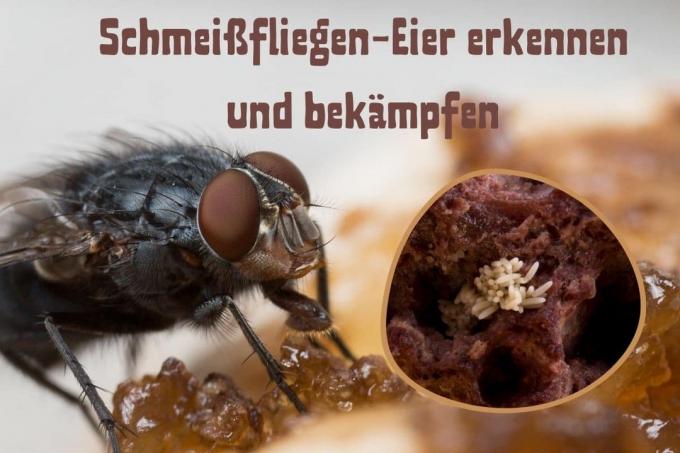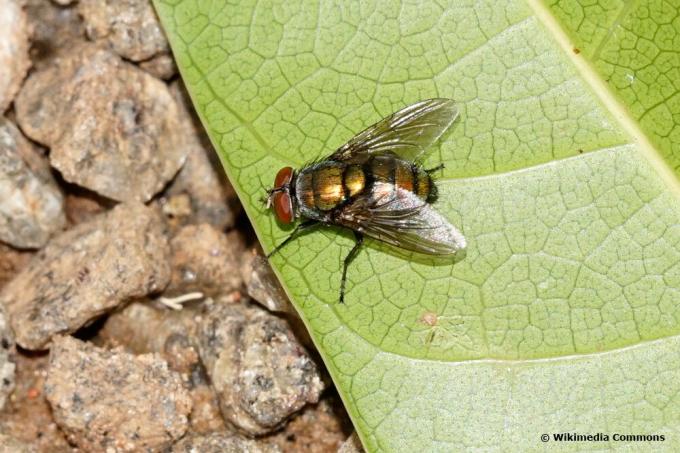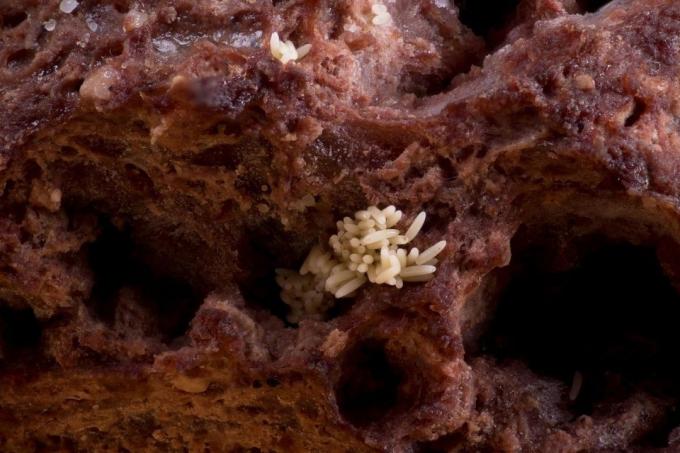
table of contents
- The background
- Favorite places in the garden
- From egg to fly
- Take preventive action
- Fight blowflies
- frequently asked Questions
In Germany there are about 45 species of the Calliphoridae. Blowflies lay their eggs in our gardens, among other places. In their multitude, they then often become a nuisance.
In a nutshell
- Blowflies find good places to lay their eggs in the garden
- they prefer intensely smelling, organic storage locations
- an infestation is bothersome and harmful to health
- Prevention is better than fighting
The background
Blowflies occur everywhere in nature. They live on nectar, pollen, honeydew and mushrooms. Blowflies lay several hundred eggs to reproduce. They prefer protein-rich and organic substances when laying eggs so that the offspring are well cared for. Larvae then hatch from the eggs and develop into flies. When choosing where to lay, the animals rely on their olfactory organ. They prefer strong smelling fragrances, which people tend to find offensive. For example the scent of:

- rotting fruit
- Animal feces
- rotting plants
- standing water
- Animal carcasses
Favorite places in the garden
In our gardens at home, the flying insects always find places to lay their eggs. In the most common cases these are:
- the compost heap
- long grass
- the rain barrel
- the garden pond
- Windfall places
Note: The flies also prefer well-tempered and dark storage locations.
From egg to fly
The clutches of blowflies contain up to 600 white eggs, which are laid in bundles. They are similar in shape and color to rice grains, but thinner and slightly longer. A bundle can be of different sizes. Depending on the number of eggs, the size varies between a 1-cent coin and a 2-euro coin. Small, white worms then develop from the eggs: the maggots. This can happen very quickly. It takes between 30 minutes and 24 hours for the larvae to hatch. These then develop into flies within about ten days.

Note: Blowflies are particularly active from April to October. If you see a bunch of eggs, you will recognize it clearly.
Take preventive action
In order to avoid an infestation with the annoying insects, you can take effective preventive measures. This is easier than getting rid of the animals once they are there. Preventive measures aim to ensure that the flies do not lay their clutch in the garden at home because there is no suitable place there or because they find repulsive features. You can take the following preventive measures:
- avoid long grass by mowing regularly
- Cover rain barrels and other standing water
- keep the garden pond moving (for example by a fountain)
- avoid unpleasant and intense smells
- Collect windfalls in good time
- Spread the scent of alcohol (the flies don't like it)
- Do not leave food in the garden
- Put away used dishes immediately
There are also some plants that the insects do not like. The smell drives them away. You can plant these plants in popular locations:
- elder
- Lead bush
- mint
- lavender
- basil
- Geraniums
- tomatoes
- laurel

Tip: the Venus flytrap devours flies as live food and can have a preventive effect against fly infestation. Spiders are also a natural enemy of flies. If you don't mind, spiders are welcome to lay out their webs in the garden.
Fight blowflies
If you see a nest of flies, maggots or a high incidence of blowflies, you can fight them with various means. It doesn't necessarily have to be the chemistry club. Follow these steps:
- Egg clutches and maggots should be removed and destroyed
- remove the point of attraction (water, fruit, smells)
- set up a trap from the hardware store
- natural fragrances (s. above)
Tip: You can also redirect the flies after the acute fight. If you just don't want to be too close to the house, put a mixture of molasses and cornmeal in a far corner of the garden. The flies will move there soon.
frequently asked Questions
Yes. The flies seem harmless, but can cause diseases. They are considered hygiene pests and cause gastrointestinal infections, salmonella, pneumonia, tuberculosis, typhoid, cholera and blood poisoning. The pathogens pass them on through digestive juices that they leave on food and surfaces.
Since flies increasingly lay their clutch on food, it happens that people eat them with them. In general, you should therefore check your food carefully before consuming it. If it does happen anyway, the eggs usually die from stomach acid. In rare cases and in children, the sick and the elderly, health problems can arise. If you feel sick or have gastrointestinal discomfort, see your doctor.
Even if flies are annoying and in some cases harmful to health, they are useful for nature. They are an important part of the food chain and feed reptiles, amphibians, birds, fish, spiders, dragonflies, wasps and small mammals. And with larvae, flies decompose organic material and contribute to the formation of humus.
If your composter is too populated by flies, it is likely too wet. Rot develops which attracts flies. To keep the compost drier, you can put newspaper, egg cartons, bark mulch, leaves or wood chips between the kitchen waste and the cut lawn. There are also ecological pesticides on the market that decompose odors and prevent eggs from being laid.
